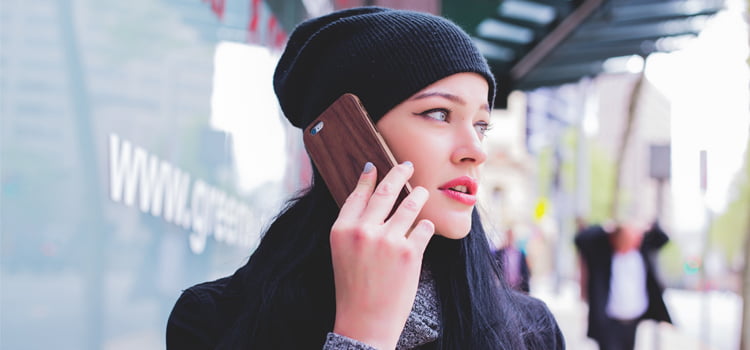Recording calls can be a touchy subject as it conjures up images of conspiracy theories and being chased by men in black. Although it all sounds like a top government plan to listen to you, chances are you are probably not a top target for corporate espionage and I would hazard a guess your interest in this article is not that malicious in intent.
Why would you want to record calls?
At CallTap we wanted to create a simple and straightforward call recording app for the iPhone and for professionals to use for their day-to-day tasks. Now in some cases you would ask – why would I record a call?
So to avoid any conspiracy theories and try to clean up the image of call recording, here are some reasons why you would record a call.
In a professional setting, recording an iPhone call could help you by:
- Improving professional development. With soft skills becoming an area that is lacking for many professionals practicing your communication skills is important. Recording a call can help you listen back to a sales call, a pitch or just about any reason from improving your professional self.
- Keep notes from important meetings and projects where having a recording can help to provide some missed information.
- Store interviews with journalists can provide some great content opportunities and having a recording of the call just improves the creative flow.
In a personal setting recording an iPhone call could help you to:
- Manage conflict by recording a call which saves endless hours of he-said, she-said.
- Record a phone prank so that you can share the results with friends and family.
<h3>What to Know Before You Record Using an iPhone Call Recorder App</h3>
We regularly talk with <a href="https://itunes.apple.com/app/apple-store/id1413904420?mt=8">CallTap</a> users to learn how we might improve the app. People use our <a href="https://calltap.app/">iPhone call recorder app</a> for many reasons: designers and product people use it to record user interviews, journalists use it to <a href="https://calltap.app/journalists-use-a-phone-call-recorder/">record interviews</a>, business and sales people use it to <a href="https://calltap.app/the-importance-of-listening/">record negotiations</a>, and some people use it to record calls with customer-service agents.
Users frequently ask us if it is legal to record phone calls using our iPhone call recorder app. The short answer is yes, it’s legal to record phone calls if all involved parties consent to being recorded. In some cases, it might be legal to record a call without informing the other party. This is known as one-party consent. We recommend always informing the other party as a common courtesy.
Here’s how the laws break down by country:
USA
Federal law allows for “one-party consent.” As long as you’re on the call and you’re OK with being recorded, it’s legal. According to the Digital Media Law Project, 38 U.S. states and Washington, D.C. adhere to the one-party consent rule.
The other 12 states have adopted “two-party consent” laws, which means everyone on the call must consent to being recorded on any iPhone call recorder app. These two-party states are California, Connecticut, Florida, Illinois, Maryland, Massachusetts, Montana, New Hampshire, Pennsylvania, and Washington. In some states consent just means going ahead with the call after being informed that it’s being recorded. Check Wikipedia for the laws in your state. If you’re calling someone in another state, check their laws, and play it safe by following whichever is more restrictive.
<h3>Canada</h3>
<p style="margin-right: 0px; margin-left: 0px; color: #878a95; font-family: Poppins, sans-serif;">An individual <a href="https://laws-lois.justice.gc.ca/eng/acts/c-46/section-184.html">can record</a> a phone call without obtaining the consent of the other participant. (<em>When speaking to a Canadian, just assume you’re being recorded, eh?</em>) Businesses must inform individuals if a call is being recorded and offer alternatives.</p>
<h3>Australia</h3>
<p style="margin-right: 0px; margin-left: 0px; color: #878a95; font-family: Poppins, sans-serif;">Laws differ among states and territories, but the federal <a href="https://www.efa.org.au/Issues/Privacy/tia.html">Telecommunications (Intercept and Access) Act of 1979</a> deemed it illegal to record people without their knowledge. Some territories allow for one-party consent recording by private individuals, while others require two-party consent. Check the laws of your state or territory before you record someone without their consent. For business-related calls, the other party must give consent or be transferred to another, non-recorded line, or be allowed to end the call.</p>
<h3>New Zealand</h3>
<p style="margin-right: 0px; margin-left: 0px; color: #878a95; font-family: Poppins, sans-serif;"><a href="http://www.legislation.govt.nz/act/public/1961/0043/latest/DLM329804.html">One-party consent</a>. (It’s like Australia’s Canada.)</p>
<h3>Japan</h3>
<p style="margin-right: 0px; margin-left: 0px; color: #878a95; font-family: Poppins, sans-serif;">The law <a style="background-color: #ffffff;" href="http://www.courts.go.jp/app/hanrei_en/detail?id=494">allows</a> you to record a phone call with someone without their knowledge, but you can’t broadcast that call without breaking privacy rules.</p>
<h3>United Arab Emirates</h3>
<p style="margin-right: 0px; margin-left: 0px; color: #878a95; font-family: Poppins, sans-serif;">UAE is strictly <a href="https://www.lexology.com/library/detail.aspx?g=56bfd7e8-85cf-45ba-85a9-8f3360f5bff6">two-party consent</a>. Recording people without their knowledge is considered a breach of privacy and could land you in jail or result in a hefty fine.</p>
A few years ago, an Emirati woman faced jail for recording a phone call with a man who failed to fulfill a contract. The man confessed his failure over the phone, and the woman played the tape to the police. They charged the man with cheating and theft, but they also charged her for interfering with the man’s “privacy and sanctity.” No word on whether the woman was angry enough to still consider this a win.
We hope this gives you peace of mind when using CallTap to record phone calls, but this is not legal advice. If you think there’s a chance what you intend to do might be illegal, please get professional legal advice in advance.

Comments
One response to “Is Recording Phone Calls Legal?”
[…] things first, be sure to check your local laws regarding call recording. This varies greatly on a country by country basis so remember to check and double […]